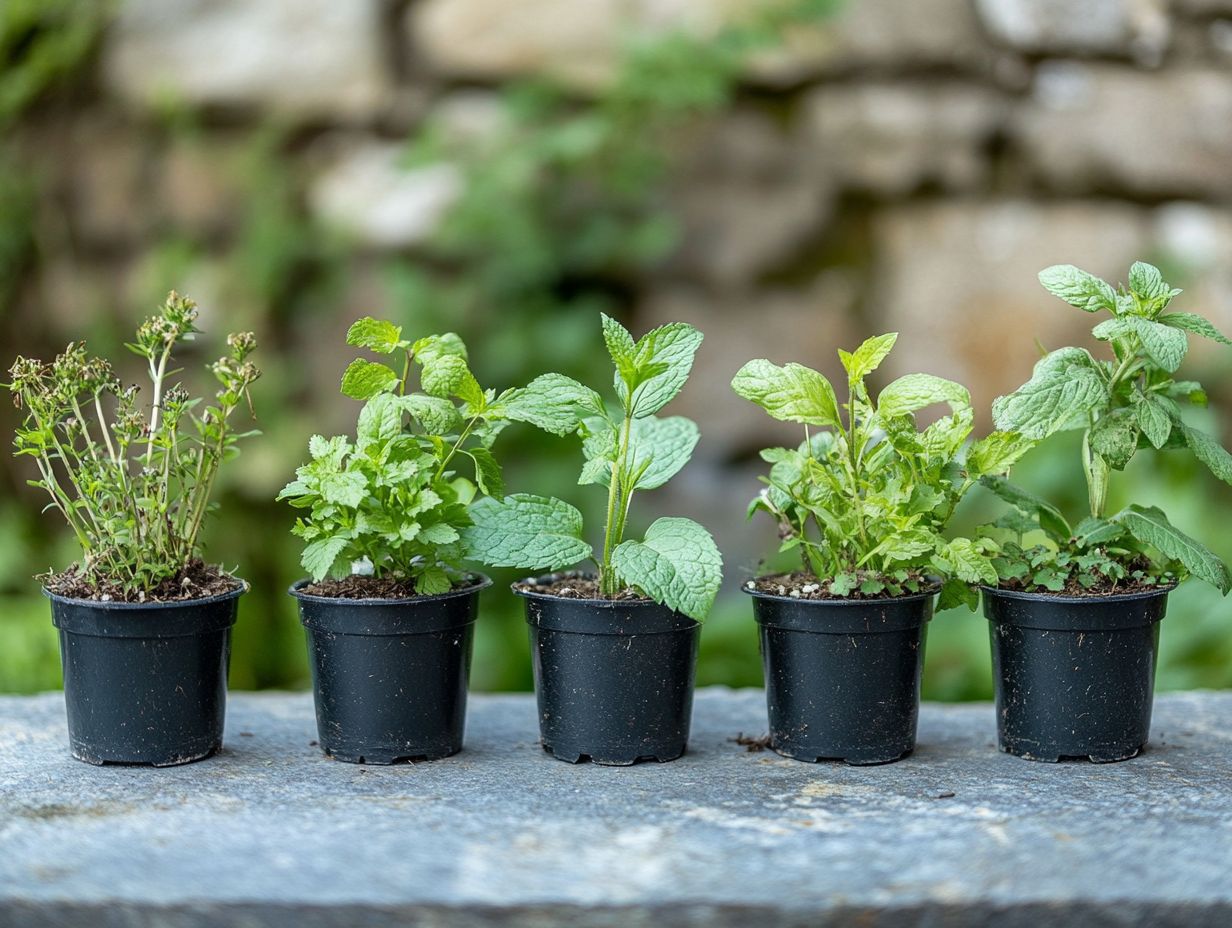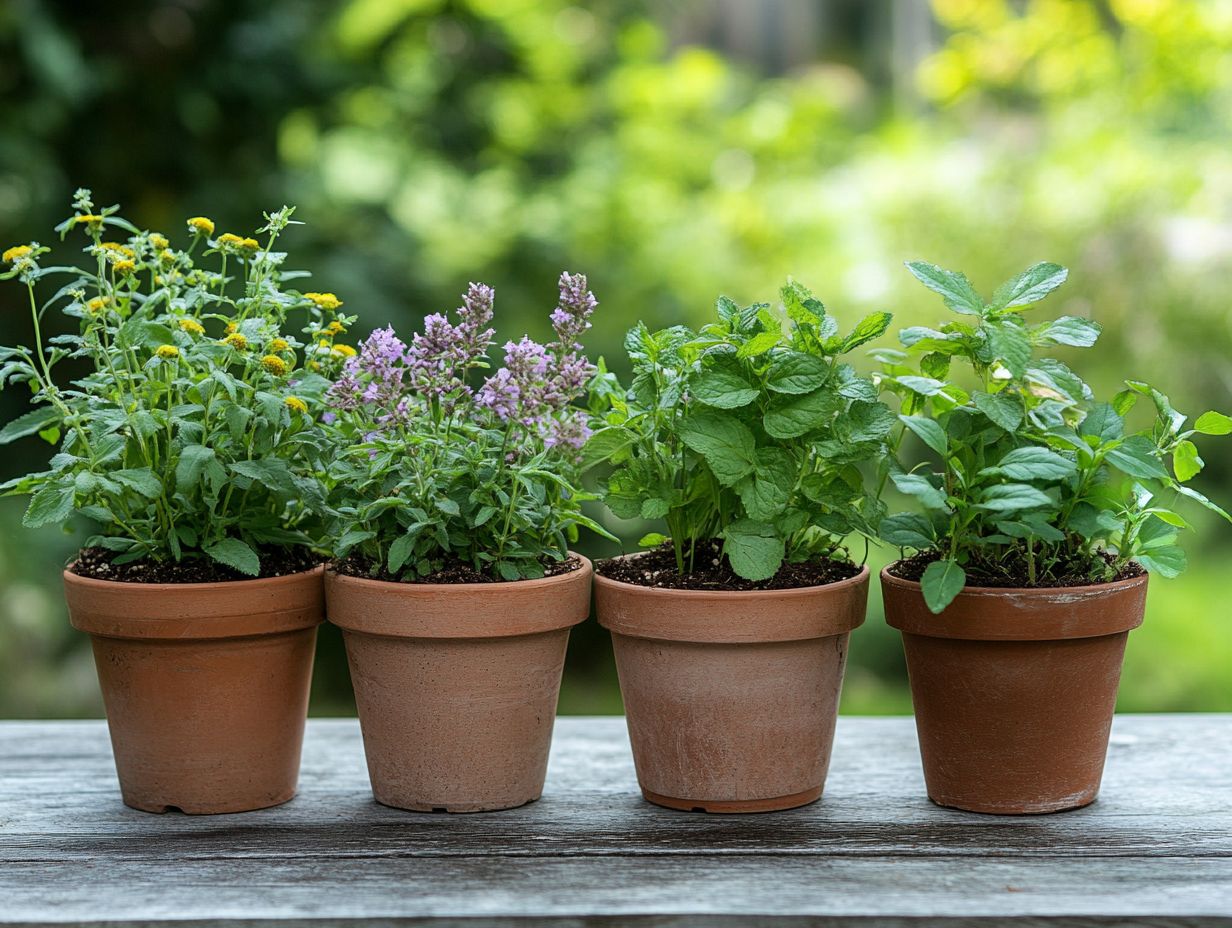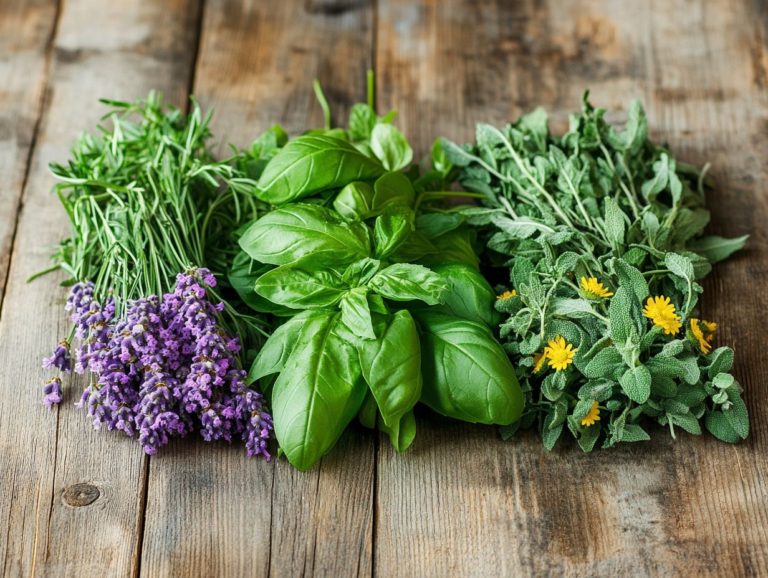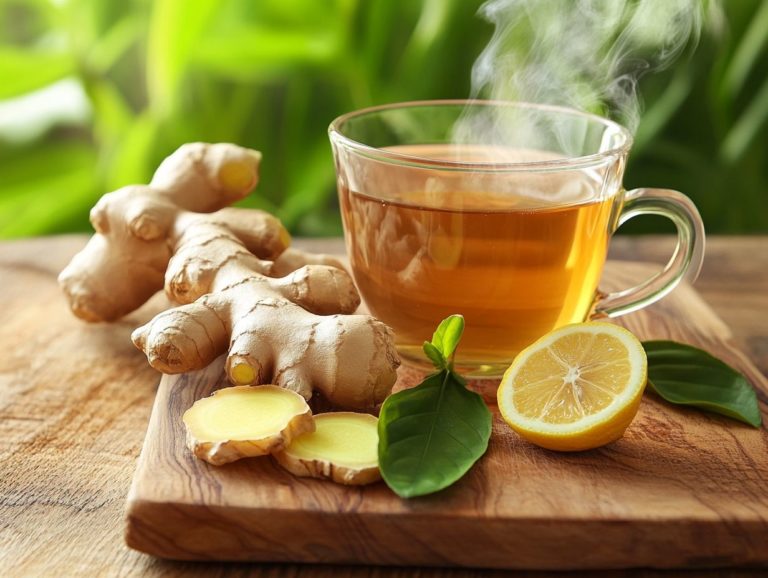5 Effective Herbal Remedies for Allergies
Allergies can turn your everyday life into a relentless struggle. They prompt you to seek relief amid an overwhelming array of over-the-counter medications.
Thankfully, nature presents a treasure trove of herbal remedies known for their effectiveness in alleviating allergy symptoms. You ll explore five powerful herbs: Butterbur, Turmeric, Stinging Nettle, Quercetin, and Licorice Root. You ll also gain insight into what allergies are, their common symptoms, and how these natural solutions can seamlessly integrate into your treatment plan.
Discover how these herbal remedies can provide relief and enhance your overall well-being.
Contents
Key Takeaways:

Butterbur is a natural antihistamine that can alleviate allergy symptoms like sneezing and a runny nose.
Turmeric contains curcumin, a compound with anti-inflammatory properties that can reduce allergic reactions and promote overall immune health.
Stinging Nettle may relieve nasal congestion and itchy eyes caused by allergies due to its anti-inflammatory and antihistamine properties.
1. Butterbur
Butterbur is a powerful natural remedy that can effectively alleviate seasonal allergies. It reduces symptoms like nasal congestion and sneezing by supporting your immune system s response to allergens, such as pollen.
This herbal supplement has gained attention for its potential to inhibit histamine production, making it an appealing alternative to traditional antihistamines. Used for centuries in Europe, Butterbur has been celebrated not only for its flavor but also for its remarkable medicinal properties.
Research reveals that its active compounds, particularly petasin and isopetasin, are key players in its anti-inflammatory and antihistamine effects. Clinical studies suggest that a dosage of 50 to 75 mg of standardized Butterbur extract taken twice daily can effectively relieve allergy symptoms, often with fewer side effects than many over-the-counter medications.
Butterbur offers a more natural option that some individuals find just as effective as conventional allergy treatments like cetirizine or loratadine. This underscores its role in the ever-evolving realm of complementary therapies for seasonal allergies.
2. Turmeric
Turmeric, celebrated for its remarkable anti-inflammatory properties, serves as an effective natural remedy for seasonal allergies. It enhances your immune system while alleviating allergy symptoms.
The star of the show, curcumin, plays an essential role in this process. It inhibits enzymes that encourage inflammation and fosters the production of anti-inflammatory compounds. Discover how curcumin can powerfully lower cytokine levels, which often swell during allergic reactions.
You can easily weave turmeric into your meals think smoothies, soups, or curries or indulge in a soothing cup of golden milk. For a more concentrated dose, turmeric supplements are readily available.
Recent studies highlight that a daily intake of curcumin can result in significant improvements in chronic inflammatory conditions. This makes turmeric a promising ally for those grappling with allergies.
3. Stinging Nettle
Stinging Nettle stands out as a distinguished natural remedy for seasonal allergies. Its anti-inflammatory properties effectively alleviate allergy symptoms by inhibiting histamine production in the body.
This remarkable plant has a rich history in herbal medicine, utilized for centuries by ancient civilizations that recognized its diverse health benefits. Packed with vitamins A, C, K, and a range of essential minerals, Stinging Nettle boasts a robust nutritional profile that supports your overall wellness.
You can enjoy Stinging Nettle in various forms, such as teas, dried leaves, or capsules, making it easy to incorporate into your daily routine.
Recent clinical studies reveal that Stinging Nettle not only alleviates allergy symptoms but also enhances the quality of life for those dealing with allergic rhinitis.
In Summary: Natural remedies like Butterbur, Turmeric, and Stinging Nettle offer effective relief from allergy symptoms. They can enhance your well-being while reducing reliance on conventional medications. Explore these options and consider incorporating them into your allergy management plan today!
4. Quercetin

Quercetin is a potent natural compound found in many plants that serves as a natural antihistamine. It is a favored option for managing seasonal allergies. Quercetin stabilizes mast cells and reduces histamine production, helping alleviate common allergy symptoms like sneezing and itchy eyes.
Quercetin also offers many health benefits. It has anti-inflammatory and antioxidant properties that may assist in combatting chronic diseases such as heart disease and cancer.
You can find rich sources of quercetin in various fruits and vegetables, particularly in apples, onions, citrus fruits, and berries. By incorporating these foods into your diet, you can significantly enhance your overall health.
If you’re considering supplements, a typical dose ranges from 500 to 1,000 mg per day. Always check with your healthcare provider for the best advice, especially if you’re on blood thinners or have gastrointestinal discomfort.
5. Licorice Root
Licorice root has been a cherished ally in traditional medicine for centuries. It serves as a natural remedy for seasonal allergies. Its ability to support the immune system and alleviate allergy symptoms comes from its anti-inflammatory properties and expectorant qualities.
This herb contains active compounds like glycyrrhizin and liquiritin, recognized for enhancing bronchial function and providing soothing relief to irritated respiratory tracts. Unlike conventional antihistamines, which often leave you feeling drowsy, licorice root offers a gentler path to allergy relief.
However, be cautious with licorice root; excessive use can lead to serious side effects, such as elevated blood pressure or potassium depletion. When weighed against other allergy relief options, like nasal sprays or over-the-counter medications, licorice root can emerge as a compelling supplementary treatment. Consume it responsibly ideally in the form of teas or capsules as advised by a healthcare professional.
What Are Allergies and How Do They Affect the Body?
Allergies are your immune system s overzealous reactions to substances that are usually harmless, known as allergens. These reactions can trigger a wide spectrum of symptoms, from mild annoyances like sneezing and itchy eyes to severe conditions like anaphylaxis, a life-threatening allergic reaction.
Allergic rhinitis, often called hay fever, is a particularly common form affecting millions, especially during high pollen seasons. Your immune system mistakenly identifies everyday substances like pollen, dust mites, or pet dander as threats.
This misjudgment leads to an overproduction of antibodies, resulting in symptoms that can swing from mere discomfort to crippling issues, impacting your daily activities and overall well-being.
As certain allergens surge with the changing seasons, particularly in spring and fall, you might notice a spike in allergic rhinitis cases. By grasping how these immune responses work, you can manage your allergies more effectively, reducing their impact on your life and health.
What Are the Common Symptoms of Allergies?
Common symptoms of allergies include sneezing, nasal congestion, itchy or watery eyes, and skin rashes. These symptoms can vary significantly in severity and are often worse during certain seasons, especially for those with allergic rhinitis.
If you have mild seasonal allergies, you might sneeze occasionally and deal with watery eyes, but your daily activities may remain manageable. For others, the same symptoms can escalate into something far more serious, leading to intense throat swelling, difficulty breathing, or even anaphylaxis in rare cases.
Understanding how different allergens spark distinct reactions is essential. Pollen from trees or grasses might set off sneezing and a runny nose, while pet dander could trigger skin irritations or eczema flare-ups.
Recognizing these differences is crucial for effectively managing and treating allergic reactions.
For more information on managing your allergies, consider consulting a specialist or exploring additional resources.
How Can Herbal Remedies Help with Allergies?

Herbal remedies can help manage seasonal allergies. They support your immune system and reduce inflammation, providing a natural alternative to conventional antihistamines.
This holistic approach highlights the exciting synergy between nature and your health.
For instance, butterbur has shown in clinical trials that it can effectively alleviate allergy symptoms like sneezing and runny nose, much like traditional medications. Turmeric also offers potent anti-inflammatory properties through its active compound, curcumin, which can relieve nasal congestion and irritation.
Quercetin, a powerful flavonoid found in various fruits and vegetables, helps stabilize mast cells, minimizing histamine release.
These natural solutions not only provide relief but also empower you to take charge of your health in a sustainable way.
What Are the Possible Side Effects of Using Herbal Remedies?
While herbal remedies can effectively manage seasonal allergies, it s crucial to be aware of potential side effects such as allergic reactions or digestive issues. Interactions with other medications are also a concern, underscoring the importance of consulting a healthcare professional before use.
Popular options like butterbur and stinging nettle have shown promise but can sometimes result in headaches or gastrointestinal discomfort for some individuals. If you re on prescription medications, it s especially important to exercise caution, as some herbs can amplify or diminish the effects of these drugs.
Before trying these remedies, conduct thorough research and consult with an expert in herbal medicine or your healthcare provider. This ensures a safe and informed approach to finding relief from allergy symptoms.
How Can One Incorporate Herbal Remedies into Their Allergy Treatment Plan?
Incorporating herbal remedies into your allergy treatment plan can be beneficial, but it s essential to approach this thoughtfully. Individual needs and potential interactions with other treatments must be considered.
A careful evaluation of your specific symptoms can help you match them with the right herbs. For example, nettle or butterbur may be effective for seasonal allergies. Typical dosages often begin at 300 mg daily, divided into smaller doses.
Taking these remedies in the morning or early afternoon can effectively combat daytime symptoms. Keeping a journal to track how herbal interventions affect your symptoms can provide valuable insights.
Regular consultations with healthcare professionals will ensure that any adjustments to your dosages or timing are made safely and effectively, maximizing benefits while minimizing risks.
What Are the Other Benefits of Using Herbal Remedies for Allergies?
Beyond alleviating allergy symptoms, herbal remedies offer additional health benefits. They can enhance immune function, reduce inflammation, and boost overall well-being, making them versatile options for holistic health.
These natural solutions often complement conventional treatments, providing supportive care that delivers not only relief but also preventative health benefits. Certain herbs help strengthen your body’s defenses against pathogens, thanks to their rich array of antioxidants and phytochemicals.
Their anti-inflammatory properties can manage chronic conditions, while some remedies promote gut health by aiding digestion and nutrient absorption.
Incorporating herbal solutions into your health routine could lead to a more balanced and resilient body overall.
Frequently Asked Questions

1. What are 5 effective herbal remedies for allergies?
The 5 effective herbal remedies for allergies are nettle leaf, butterbur, elderberry, ginger, and turmeric.
Talk to a healthcare provider today to explore these natural remedies!
2. How does nettle leaf help with allergies?
Nettle leaf has anti-inflammatory properties that may decrease allergy symptoms like sneezing and itching. It also boosts immune function and lowers histamine levels in the body.
3. Can butterbur help with seasonal allergies?
Yes, butterbur effectively reduces the symptoms of seasonal allergies, including sneezing, runny nose, and itchy eyes. It blocks chemicals that trigger allergic reactions.
4. How does elderberry benefit those with allergies?
Elderberry contains anti-inflammatory and antioxidant properties. These can lessen allergy symptoms like nasal congestion and coughing while also supporting the immune system.
5. Can ginger help with food allergies?
Yes, ginger is effective in reducing symptoms of food allergies, such as nausea and vomiting. It contains compounds that help stop the production of chemicals involved in allergic reactions.
6. Is turmeric safe to use for allergies?
Absolutely! Turmeric is a fantastic choice for managing allergies. Its anti-inflammatory and antioxidant properties can ease symptoms like congestion and sneezing. Always consult a healthcare professional before trying new remedies.





